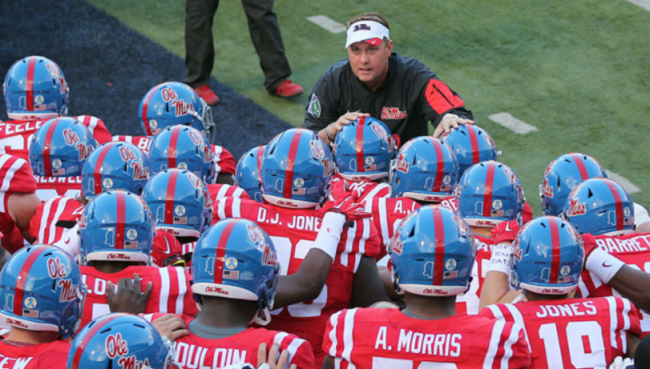You have /5 articles left.
Sign up for a free account or log in.

University of Mississippi
The University of Mississippi announced on Friday that it had self-imposed several penalties for 28 violations of National Collegiate Athletic Association rules, including committing academic fraud.
The university received the NCAA’s notice of allegations in January, and released the notice to the public on Friday, along with a response detailing the sanctions it had decided to place on itself. Hoping to avoid any further punishment by the NCAA, the university highlighted the seriousness of its self-imposed penalties, which include forfeiting 11 football scholarships and an already served postseason ban for its women’s basketball team.
“It is difficult to imagine how the university could have cooperated more fully over the past 44 months,” the university said in its response. “What started as a very effective three‐week investigation of women’s basketball has turned into a process that will span four years before this committee issues its report. The university has admitted violations when they occurred and accepted responsibility for them. The university’s insistence on going the extra mile should be recognized as exemplary cooperation.”
Among the NCAA's allegations are that the university and its boosters loaned cars to athletes, provided free lodging to players, and gave cash to students and their families. The women’s basketball staff, the association said, sent 320 impermissible text messages and placed 62 impermissible telephone calls to recruits.
The association also alleges that football and women’s basketball coaches committed academic fraud.
Between May and June 2012, an assistant women’s basketball coach and the women’s basketball director of operations, who are married, signed up for several online courses on behalf of two prospective players who were still enrolled at two-year institutions. The couple paid for the courses and completed homework assignments, papers, quizzes and exams for the recruits.
As a result, the players were able to complete their associate degrees and satisfy the NCAA’s two-year transfer eligibility requirements.
When the NCAA began investigating the fraud, the assistant coach instructed the players to delete any text messages that were relevant to the investigation. She told the players to lie about the staff’s involvement in paying for the course and to say that the athletes had completed all their assignments on their own.
The university dismissed both coaches in 2012, and placed its head women’s basketball coach on administrative leave.
“The NCAA has alleged, and we agree, that serious violations have occurred,” the university said in a statement. “Most of the more significant violations resulted from either intentional misconduct and efforts to conceal that misconduct by former employees who face unethical conduct charges and personal sanctions.”
In the summer of 2010, David Saunders, then an assistant coach for the football team, arranged for three prospective athletes to take their ACT exams at Wayne County High School in Waynesboro, Miss. According to the NCAA’s notice of allegations, Saunders told the recruits to refrain from answering any questions that they found difficult. Saunders then arranged for the ACT supervisor at the testing site to alter the exam answer sheets so they would receive higher, fraudulent, scores.
If this situation sounds familiar, it’s because Saunders later pulled the same scam as an assistant coach at the University of Louisiana at Lafayette.
According to an NCAA investigation earlier this year, the assistant coach arranged for Louisiana-Lafayette recruits to take or retake the ACT at the same Mississippi testing center he used in 2010, even though it was hundreds of miles from where the players lived. In most cases, the athletes had performed poorly the first time they took the test, and on the answer sheets from the Mississippi center, scores of responses were changed.
The University of Louisiana at Lafayette was sanctioned by the NCAA, and said it generally accepted the association’s findings, but it is suing ACT for not taking “reasonable precautions” to ensure the scores were valid.
In its response to the NCAA notice of allegations, the University of Mississippi also said that it accepted responsibility for the actions of its former employees, but noted that it had flagged the test scores as potentially fraudulent upon receiving them in 2010. Noticing that the scores were far higher than what the athletes had usually produced, the university asked that ACT review and validate the results.
“Like other NCAA institutions across the country, the university reasonably relied on ACT to take appropriate steps to determine whether the test scores were valid,” the notice stated. “The university did not admit the student-athletes, give them financial aid, or allow them to participate in football activities until after ACT validated the scores.”




